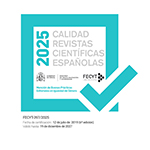Orientaciones para la intervención logopédica con niños bilingües
Resumen
Los crecientes movimientos migratorios y las demandas sociales de manejo de lenguas para el desarrollo personal y profesional han aumentado el interés por la educación bilingüe. En el Estado Español encontramos un apoyo institucional emergente para la implantación de programas bilingües en lenguas extranjeras así como en lenguas cooficiales y dialectos regionales. Las investigaciones recientes destacan el bilingüismo como una opción que beneficia el desarrollo del lenguaje y de la cognición. Sin embargo, en población que presenta alteraciones del lenguaje aún quedan muchas cuestiones por resolver. Los profesionales se enfrentan a una gran variedad de contextos y situaciones bilingües y la información sobre desarrollo típico, atípico y sobre la efectividad de diferentes modelos de tratamiento es escasa. La presente revisión trata de organizar la información disponible sobre desarrollo y sobre evaluación e intervención basada en la evidencia para orientar a los profesionales en la toma de decisiones y en el asesoramiento a familias de niños con dificultades del habla y el lenguaje en entornos bilingües.Descargas
Descarga artículo
Licencia
La Revista de Investigación en Logopedia, para fomentar el intercambio global del conocimiento, facilita el acceso sin restricciones a sus contenidos desde el momento de su publicación en la presente edición electrónica, y por eso es una revista de acceso abierto. Los originales publicados en esta revista son propiedad de la Universidad Complutense de Madrid y es obligatorio citar su procedencia en cualquier reproducción total o parcial. Todos los contenidos se distribuyen bajo una licencia de uso y distribución Creative Commons Reconocimiento 4.0 (CC BY 4.0). Esta circunstancia ha de hacerse constar expresamente de esta forma cuando sea necesario. Puede consultar la versión informativa y el texto legal de la licencia.












